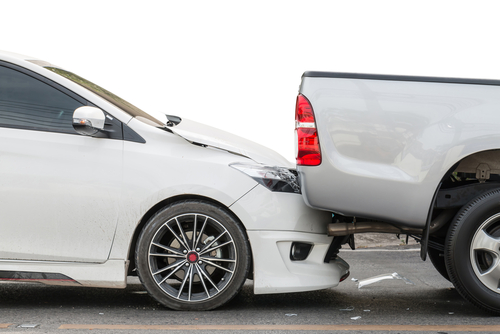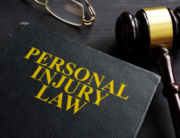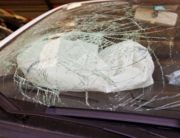When a driver crashes into the rear end of another vehicle in Florida, the rear driver is presumed to be at fault for the accident. The law requires every driver to maintain a safe following distance from the driver in front of them, so a driver usually only has to prove that they were rear-ended for the other driver to be found at fault.
The Rear Driver Is Presumed At Fault
Regarding which driver is liable for a rear-end collision in Florida typically falls under the responsibility of the rear driver. Florida law does not state a specific following distance that drivers of commuter cars must maintain between themselves and other vehicles. A “reasonable and prudent” distance is mandated instead. Drivers must also consider the “condition” of the road.
A “reasonable” distance depends upon the type of road the driver is on, the placement and speed of other cars, and the weather. For example, a driver should lengthen their following distance on the road at night while the streets are wet, as the conditions are less safe than they would be during the day while the roads are dry.
The Rear Driver Can Overcome the Presumption of Fault
The rear driver may fight to prove the other driver was at fault. For instance, if the rear driver can present evidence that the front driver slammed on their brakes without just cause after pulling in front of their vehicle, the front driver could be liable for the accident and the rear driver would overcome the presumption of guilt.
Proving Fault for a Rear-End Collision
For the driver in the front to recover compensation for injuries caused by a rear-end collision, four elements must be proven:
- The rear driver was legally required to take to maintain a safe following distance to ensure your safety.
- The rear driver failed to maintain a safe following distance.
- The rear-end collision was the foreseeable and actual cause of your injuries.
- You were injured by the accident.
If you are the rear driver, you must prove the driver in the front behaved negligently and caused you to rear-end them, causing your injuries.
You Can Still Recover Compensation If You Were Partially At Fault for the Accident
Florida uses a system of comparative negligence (Florida Statute § 768.81). This means that if a jury finds that a front-driver is at fault for their own injury, the jury will assign a percentage of fault to each party and reduce the front driver’s compensation accordingly.
For example, if the front driver’s brake lights were not functioning at the time of the collision, a court or jury may find that this represented 10% of the cause of the crash. In this example, the front driver may still recover 90% of the damages requested. If the front driver asked for $50,000, they would be able to recover $45,000. Some potential defenses that a rear driver may assert after a rear-end collision include:
- The front driver’s tail lights were not functional
- Successive car crashes
- A sudden and unexpected stop
- Mechanical malfunction
- Illegal maneuver by the front driver
A rear-end collision does not automatically mean that the rear driver will be held liable. Regardless of your role in the accident, you are expected to drive in a prudent and reasonable manner given the circumstances at the time of the collision.
Potentially Recoverable Damages in a Rear-end Collision Case
You may be able to recover compensation to cover the costs of:
- Past and future medical treatment
- Pain and suffering
- Lost wages
- Reduced earning capacity
- Property damage
- Miscellaneous expenses such as childcare, yard work, or helping out around the house
The types of compensation you may be eligible to receive will depend upon the unique circumstances of your case. Some losses may be more difficult to prove than others.
Consider the Statute of Limitations on Car Accident Cases
In the state of Florida, plaintiffs generally have four years to file a claim under the statute of limitations. If you fail to file a lawsuit within this time period, the statute will likely bar you from doing so later. We recommend you get started as soon as possible as memories may fade and evidence may get lost. A lawyer from our firm will keep this in mind, and may be able to avert this timeline, if appropriate to your circumstances.
If You Lost a Loved One, You Have Our Deepest Sympathies
If you lost your loved one in a rear-end accident, we express our condolences. Financial compensation can in no way bring back your loved one, but damages could alleviate some financial pressure you may face. Keep in mind that most wrongful death claims must be filed within two years under Florida law. Let us help you hold the negligent driver responsible for your loss.
Call Montero Law Center if You Have Been Involved in a Rear-End Collision
A lawyer from our firm can work with you to form a case. We are prepared to:
- Gather evidence to support your case
- Interview witnesses
- Analyze police and accident reports
- Visit the scene of the accident
- Valuate your damages
- Pursue a fair settlement for your damages
- Negotiate with insurers
- Represent you in court, if necessary
- Protect your rights
- Handle all communication with relevant parties
- File all paperwork within the appropriate timelines
If you have been the victim of a rear-end collision in Florida, you have rights. Our attorneys would be glad to discuss your options with you. We represent rear-collision clients at no upfront cost, and you pay no attorney’s fees unless we recover compensation for you. We can help you determine an accurate estimate of the damages for which you may be entitled to recover compensation.
If you have questions about your rear-end collision, call Montero Law Center today at (954) 767-6500 for a free and confidential case evaluation.
 English
English  Español
Español 





